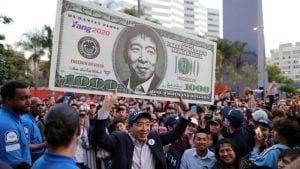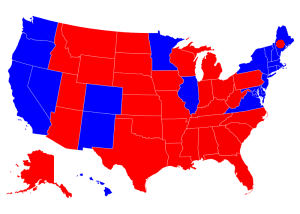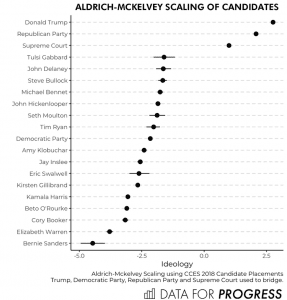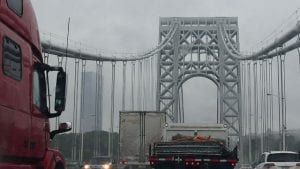 On November 6, 2017, businessman Andrew Yang began a presidential campaign centered on a signature policy, Universal Basic Income (UBI).1 If put in place, this UBI or “Freedom Dividend” would give every adult American $1,000 a month, no questions asked.2 The idea captured some voters’ imaginations; although Yang ultimately suspended his campaign after a poor showing in the Iowa caucuses and the New Hampshire primary, UBI has never been more popular.3
On November 6, 2017, businessman Andrew Yang began a presidential campaign centered on a signature policy, Universal Basic Income (UBI).1 If put in place, this UBI or “Freedom Dividend” would give every adult American $1,000 a month, no questions asked.2 The idea captured some voters’ imaginations; although Yang ultimately suspended his campaign after a poor showing in the Iowa caucuses and the New Hampshire primary, UBI has never been more popular.3
What Is UBI?
UBI is a form of government assistance wherein every adult citizen is automatically entitled to regular payment from the government. In most proposed UBI systems, this money does not have to be spent on specific goods or services; it can be used by recipients for anything they deem necessary.4 Some UBI systems call for replacing basic income entirely, making full-time employment largely optional. Others favor a more modest approach, which would supplement rather than replace individual income.
How Would Yang’s Model Work?
The current median annual individual income in the United States is approximately $33,000; the poverty line stands at just under $13,000 per year.5 At $12,000 per year, Yang’s UBI would still fall below the poverty line and therefore would not replace the need for employment for most people. However, for an individual living in poverty, an additional $1,000 a month would essentially double their income. Yang also argues that entitling adults to $1,000 per month would mean that unpaid jobs, such as stay-at-home parenting and volunteering, would no longer necessitate the same sacrifice.6 Yang also suggests that UBI could be a means of enabling people to make more time in life for personal development and interests, as they would not have to focus so much on acquiring money.7
According to Yang’s policy briefs, his UBI policy would cost $2.8 trillion per year, which is roughly 70 percent of the federal government’s current annual budget.8 Yang’s policy proposal takes other factors into account, which he claims would bring the net cost down to $320.5 billion per year. His policy would raise additional revenue by imposing a new value-added tax (VAT, a type of tax on products that consumers buy).9 However, economic experts do not agree that the cost of the program could be offset sufficiently.10
Why Is Yang Advocating for UBI?
Yang has tied the need for UBI to the threat of automation in what he calls “The Fourth Industrial Revolution.”11 Unlike previous revolutionary changes owed to technology, Yang suggests that advancements in artificial intelligence will result in jobs being lost at a higher rate than they can be replaced. On his policy site, Yang argues that in the next 12 years, one in three Americans are at risk of not just losing their jobs but having their profession itself cease to exist.12 For example, Yang believes that driverless vehicles will render trucking jobs obsolete and leave truckers with a skill set and job history that is no longer relevant when they need to find new employment. UBI could be a way to offset the harm of job loss and provide individuals with a safety net as they find new jobs or learn new skills.
What Is the Criticism of UBI?
Beyond the high cost of implementing UBI, criticisms tend to center on the implications that such a system would have on the economy. Some have suggested that UBI would disincentivize hard work and undermine the American work ethic.13 Others point to studies which show that people receiving unemployment benefits devote more time to leisure than job-hunting.14 Participants in similar smaller-scale programs were shown to be less productive and less motivated to work.15 Finally, some economists argue that prices on everything from food to rent would increase, reflecting the extra money that people would have. Therefore, little would change other than the imposition of new government spending.16
The Future of Universal Basic Income
Universal Basic Income is unlikely to come before Congress anytime soon, especially with its best-known advocate no longer in the race for president. However, prior to Yang’s candidacy, a minority of voters supported or had even heard of UBI, whereas recent polling indicates that a slim majority of voters favor the idea.17 UBI is being piloted in several U.S. cities and is far more popular in Europe, with pilot programs already underway in several countries. While this is far from the first time UBI has been promoted, it is not outside the realm of possibility that with changing economic realities, the policy could continue to gain support among policymakers.18
Discussion Questions
- Do you think that UBI would have more positive or negative effects on how Americans lead their everyday lives?
- Some proponents have suggested that UBI could eliminate the need for programs like unemployment benefits or food stamps. Do you think that would be a reasonable compromise? Or would those programs need to remain in place even with UBI?
- Think about your own family. What would an extra $1,000 per month per adult enable your family to afford what it otherwise struggles to afford or cannot currently afford? Do you think it should be the responsibility of the government and taxpayers to provide for those expenses?
- What are some additional or alternative programs to UBI that could be initiated to meet the challenges presented by automation and the potential loss of employment that could result?
Featured Image Credit: https://www.aljazeera.com/ajimpact/universal-basic-income-faces-sceptics-yang-gang-fans-190522185947811.html
[1] CNN: https://www.cnn.com/2019/08/28/us/andrew-yang-fast-facts/index.html
[2] Freedom-Dividend.com: https://freedom-dividend.com/
[3] America: The Jesuit Review: https://www.americamagazine.org/politics-society/2019/10/02/universal-basic-income-having-moment-can-advocates-convince-skeptical
[4] The New Yorker: https://www.newyorker.com/magazine/2018/07/09/who-really-stands-to-win-from-universal-basic-income
[5] U.S. Department of Health and Human Services: https://aspe.hhs.gov/poverty-guidelines
[6] Yang2020.com: https://www.yang2020.com/what-is-freedom-dividend-faq/
[7] Ibid
[8] National Priorities Project: https://www.nationalpriorities.org/budget-basics/federal-budget-101/spending/
[9] Freedom-Dividend.com: https://freedom-dividend.com/
[10] Vox: https://www.vox.com/future-perfect/2019/2/13/18220838/universal-basic-income-ubi-nber-study
[11] Newsweek: https://www.newsweek.com/andrew-yang-trump-fourth-industrial-revolution-what-it-1465649
[12] Yang2020.com: https://www.yang2020.com/what-is-freedom-dividend-faq/
[13] Forbes: https://www.forbes.com/sites/miltonezrati/2019/01/15/universal-basic-income-a-thoroughly-wrongheaded-idea/#775a349b45e1
[14] Independent Women’s Forum: https://www.iwf.org/blog/2809515/Why-Universal-Basic-Income-Will-Ruin-Lives
[15] Forbes: https://www.forbes.com/sites/miltonezrati/2019/01/15/universal-basic-income-a-thoroughly-wrongheaded-idea/#775a349b45e1
[16] Medium: https://medium.com/discourse/would-a-universal-basic-income-cause-a-major-spike-in-rent-prices-50fca12b06ab
[17] The Hill: https://thehill.com/hilltv/rising/463055-more-voters-support-universal-basic-income
[18] U.S. News & World Report: https://www.usnews.com/news/best-countries/articles/2019-10-08/canadians-and-the-british-show-more-support-for-basic-income-than-americans
 During campaigns and elections, candidates use political labels, such as liberal, moderate, progressive, conservative, and libertarian, to position themselves in relation to each other and as a shorthand for their worldviews and policy preferences. This presidential election cycle features candidates from across a wider political spectrum than most elections in recent years.
During campaigns and elections, candidates use political labels, such as liberal, moderate, progressive, conservative, and libertarian, to position themselves in relation to each other and as a shorthand for their worldviews and policy preferences. This presidential election cycle features candidates from across a wider political spectrum than most elections in recent years.
 “There’s a clear difference between politics and a crime,” Michael Levy told the Supreme Court in January,1 when he made arguments in a case about New Jersey’s “Bridgegate” scandal. As the justices considered whether or not a public official commits fraud by obfuscating the “real reason”2 behind a decision, they asked both sides tough questions and did not split along ideological lines.3 The Court’s decision could narrow or expand corruption prosecutions against politicians. So we explore the questions, do politicians lie? And is it a crime?
“There’s a clear difference between politics and a crime,” Michael Levy told the Supreme Court in January,1 when he made arguments in a case about New Jersey’s “Bridgegate” scandal. As the justices considered whether or not a public official commits fraud by obfuscating the “real reason”2 behind a decision, they asked both sides tough questions and did not split along ideological lines.3 The Court’s decision could narrow or expand corruption prosecutions against politicians. So we explore the questions, do politicians lie? And is it a crime?






